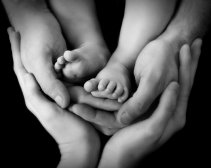The Right Spoon: Sexual Grounding Therapy Finds Paradise in Reality
by Nick Duffell (Somatic Psychotherapy Today | Spring 2013)
Why should it be so hard to talk meaningfully about sex and gender - even amongst therapists? It is a big puzzle. Is it because the sex act is the last bastion of privacy, the most post powerful stimulator and cause of excitement that we know, one which can even bring a president of the most powerful country on earth to his knees? Or is it because it is the primal act, the fount of our very existence, unknowable because it is linked to the mystery of life itself? And why is gender - an everyday reality: we are all men and women - still such a controversial subject?
My supposition is that the chief problem in getting to grips with sex and gender is how we think about these subjects. I like to remember the storyteller Michael Meade’s warning that talking about gender inevitably evokes trouble: you invariably step on someone’s hallowed ground. Gender is about difference, and difference is never easy. You cannot separate gender from the most intrinsic constituents of all life forms, nor from politics, education or society. You cannot have one- size-fits-all approach, and you cannot sidestep the nature-nurture dilemma.
While it is crucial to deconstruct the social inheritance of gender identities—what we in the London-based Centre for Gender Psychology call “unpacking our Image-makers”—it is equally vital to avoid the currently popular traps either of making sex and gender into consumer items of choice or falling into a mainstream/margin dialectic from which there is no resolution. Post-modernism has been crucial in unpacking the power dynamics but it easily becomes a dead-end street, or what contemporary philosopher Ken Wilber calls a ‘flatland’; for excessive relativism offers no values
and thereby no guidance, neither for the young, nor for their teachers.
And Talking About Sex?
Well, one might argue that our society never stops talking about sex, that we are obsessed with it, that sexual imagery dominates our visual space, that children have never been so exposed to sex as they are now. While this may be true, meaningful and informed dialogue about sex is rare: church leaders and legislators founder on the rocky complications of sexual plasticity. Even therapists are confused: good education in sexuality, particularly on most humanistic training courses, has all but disappeared. Gender and sexuality easily get relegated to diversity issues requiring a sociological approach. I think our clients and our children get dropped by this. Many therapists refer clients on when sexual problems are presented, and yet Sexology remains like a dinosaur resting safely in the medical model, split off from the everyday emotional reality that it actually is in every family in the land.
Unhappily, there is very little in print of a didactic nature that makes grounded sense about sexuality. I suggest that you may be in better hands with some serious novelists and journalists than almost anything you can find on the psychology shelves.
For example, Erica Jong’s runaway bestseller, Fear of Flying (1973) recounts precisely how a woman’s inability to resolve her mother complex affects her sexuality and relationships,
and Nancy Friday’s excellent research (1973,1977) speaks volumes about a daughter’s identity inheritance and how mothers can bodily support their children as sexual beings.
Unmentionable Organs
Actually, thinking about sex and gender is not so difficult, I propose, if we can ‘re-member’ our body’s reality. If we really want to be empowered and authentic we need to feel our existence from an embodied starting place. In Western society, our thinking has been so usurped by Cartesian/Victorian dissociation that feeling has
become estranged from thinking, since for feeling we need the body. Our inheritance is the tendency to overvalue mental activity, objectifying our bodies into images while marginalizing our instinctual body reality. Sex and gender, however, arise from the body, and have the function of creating other bodies through activity of different genitals, which we don’t really want to acknowledge.
Genitals are unique as bodily organs in how we treat them. In most spheres of life they are unmentionable, and while the genitals are still split off, taboo and thereby over-energised, it is hard to be related to as a person with a whole-body reality. We all know that what’s repressed ends up running the show, that’s how the whole therapeutic adventure started. The genitals remain taboo; and where something is taboo it means, paradoxically, that its function becomes excessively stimulating, exciting, dangerous even.
The result is that there is chronic over-excitement about sex and genitals in our world. You only have to see what the internet reveals to those eager to see genitals in vivid video, or consider the ratings of the novel 50 Shades of Gray to have living proof of this.
It is like a wildfire that needs to be contained, a live current that needs to be earthed; otherwise it leads inexorably towards a heartless void. When I look at the world around me I see our children burning up in this fire, particularly in Britain, which according to UNICEF (2007) has the least happy youngsters and the highest incidents of unwanted teenage pregnancy, to say nothing of the prevalence of child sexual abuse in the developed world. I am not surprised when I look at British culture: I see parental approaches to their adolescent offspring which are very hesitant ; people seem to think that guiding them sexually is either about having a ‘big talk’ or leaving
them well alone.
Sex education in schools, in Britain at least, is even worse: it is all about fear and disease. Teenagers don’t know what is right but they do know what is wrong; they recognise such approaches as bogus and do not feel guided, do not feel held. I suspect it will prove a legacy very hard to emerge from, unless therapists take the lead in thinking clearly about sexuality and how to help grounding it.
Parental Mirroring
The need of both boys and girls to be mirrored properly by their parents and caretakers is of prime importance in growing up. This means that their unique self-worth is reflected back to them, so
that they can grow up naturally, and achieve a healthy self-concept, free from social or familial conditions or double-binds.
In infancy, this mirroring comes from the primary caretaker, and has been the subject of much study in psychology, particularly in the Object Relations school of psychoanalysis. But in order to develop their natural right to be complete human beings, boys and girls also need to be mirrored as sexual beings, with bodies that include their genitals. This means that they need their parents’ active support and mirroring, especially at the ages of 4-6 and at puberty/adolescence, to reflect back that they are good, natural, and welcome sexual, genital beings.
This process is also necessary to help children to align with their natural energetic flow the Genital-Heart Energetic Streaming - which, according to Sexual Grounding, circulates between heart and genitals in a gender-specific way. This energy flow needs to be balanced and regulated throughout life to achieve realistic and satisfying gender identities as well as fulfilling relationships based on love and exchange.
However, due to cultural difficulties in most families, this mirroring has been largely ignored or denied. This, in turn, gives rise to a society in which many of us do not develop as complete human beings. We either experience ourselves as being cut off at the waist, living only from the head, or are greatly over-excited by sexuality. Either way, we have little real confidence in knowing what it is to be an embodied man or woman. Modern western society compounds the problem, promoting unrealistic bodily perfection and sexual excitement as part of daily commercial activity.
Thus, individuals are subject regular sexual over-stimulation in their minds and are thereby open to exploitation and shame, not to mention sexual abuse, while remaining ignorant about the true nature of sexuality. The sex act itself clearly serves the purpose of procreation, and, in a loving relationship, it can grow into a celebration of interpersonal intimacy. The heart, as the seat of feeling and the regulator of the nervous system, is the other major sexual centre and the mediator of relationship. It is also in our sex-lives that many of our emotional problems - individual and relational - come out. Increasingly though, we have been separating sexuality from relationship, and so over-riding our hearts.



